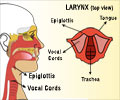Speakers with voice disorders when compared to speakers with healthy voices were found to demonstrate a tenfold increase in the number of speech intelligibility errors, revealed study.

"Fly heading two three zero, runway two seven left, cleared for takeoff." Air traffic controllers are among the 25 to 45 percent of the workforce in the United States who use their voices professionally. It is imperative for their listeners to understand what they are communicating. Air traffic controllers, teachers and university professors have a high prevalence of voice disorders referred to as "dysphonia." Other professions also are at risk including clergy, attorneys, counselors and performers.
Voice disorders are not just a problem for these professions. In fact, 1 in 13 American adults reported a voice problem in the past year. Only a minority of them got treatment, further perpetuating the overall problem. Voice disorders are a common occurrence for many people throughout their lifetime. Although it is well understood how voice disorders impact the speaker, there is little research on how voice disorders impact the listener.
"Moreover, listeners receive less salient information to process when they are listening to a person with a voice disorder,"said Connie K. Porcaro, Ph.D., first author and an associate professor in the Department of Communication Sciences and Disorders in FAU's College of Education.
Certain vowels were impacted more than others and noise and lack of harmonic components increased as the severity of perceived voice disorders increased. Seventy-eight percent of the variance associated with intelligibility errors by listeners was due to the presence or absence of voice disorders.
The researchers also discovered that the use of listener strategies did not improve speech intelligibility scores and did not increase the number of words correctly transcribed by listeners. Of interest, no matter what strategies listeners were asked to use, the majority of them reported the use of "context" to better understand the speakers and the unintelligible words.
"Studies have shown that student auditory comprehension in the classroom is reduced when teachers have voice disorders, which has a negative impact during classroom learning," said Porcaro. "People with voice disorders may need to take special care to ensure that their listeners understand their intended message and should assess their communicative situations and make appropriate modifications as needed. For example, using gestures or reducing background noise could be useful strategies to improve accuracy and the ability to be understood."
 MEDINDIA
MEDINDIA




 Email
Email





